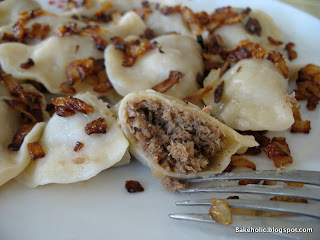Pierogi- Polish dumplings
In my previous post I have presented the traditional Polish dishes prepared for Christmas Eve dinner. There is no Pole who could imagine this day without, pierogi. It would be like Christmas without the Christmas tree or Santa Claus without presents. Pierogi, in contrast with most dishes prepared for the Christmas Eve supper, are not cooked just for this particular occasion. Poles could not cope without them in every day life. You can get them in almost any Polish restaurant and shop. However, the best pierogi are those homemade and prepared according to recipes of our grandmothers. They are made of unleavened
dough, which is simply a mix of flour and warm water. When the dough is ready, it is rolled flat and cut into circles using a drinking glass. The filling is placed in the middle and the dough folded over to form a half circle ( as presented in the following picture).
There are many kinds of pierogi since you can stuff them with almost anything you put your mind to. The most popular fillings are: mashed potatoes with pot cheese and sauteed diced onion, sauerkraut with grind mashrooms, grind meat, cottage cheese with cream, and spinach. My favourite, however barely known, are those stuffed with mashed beetroots or mashed carrots with fried bacon. Pierogi are cooked in the water and served with fried onion or sour cream. Dessert versions of dumplings can be stuffed with a fresh fruit filling, such as cherries, strawberries, raspberries or blueberries. Those are served with icing sugar or sweet cream on top.
VARIATIONS:
 |
| Pierogi with grind meat |
 |
| Pierogi with mashed potatoes, pot cheese and sauteed diced onion |
 |
| Pierogi with mashed carrot and bacon |
| Pierogi with mashed beetroot and bacon |
| Pierogi with spinach |
| Pierogi with strawberries |
In Italy - ravioli, culurgiones, tortelli, tortelloni, and tortellini
In Germany - maultashen and bierock.
In Turkey - transcaucausus
In central Asia - manti, khinkali or chuchyara
In China - wonton or jiaozi
In Korea - mandu or songpyeon
In Japan - gyoza
In Mongolia - buzz
In Nepal/Tibet - momo
In Afghanistan - mantu
In India - ghooghra
No comments:
Post a Comment